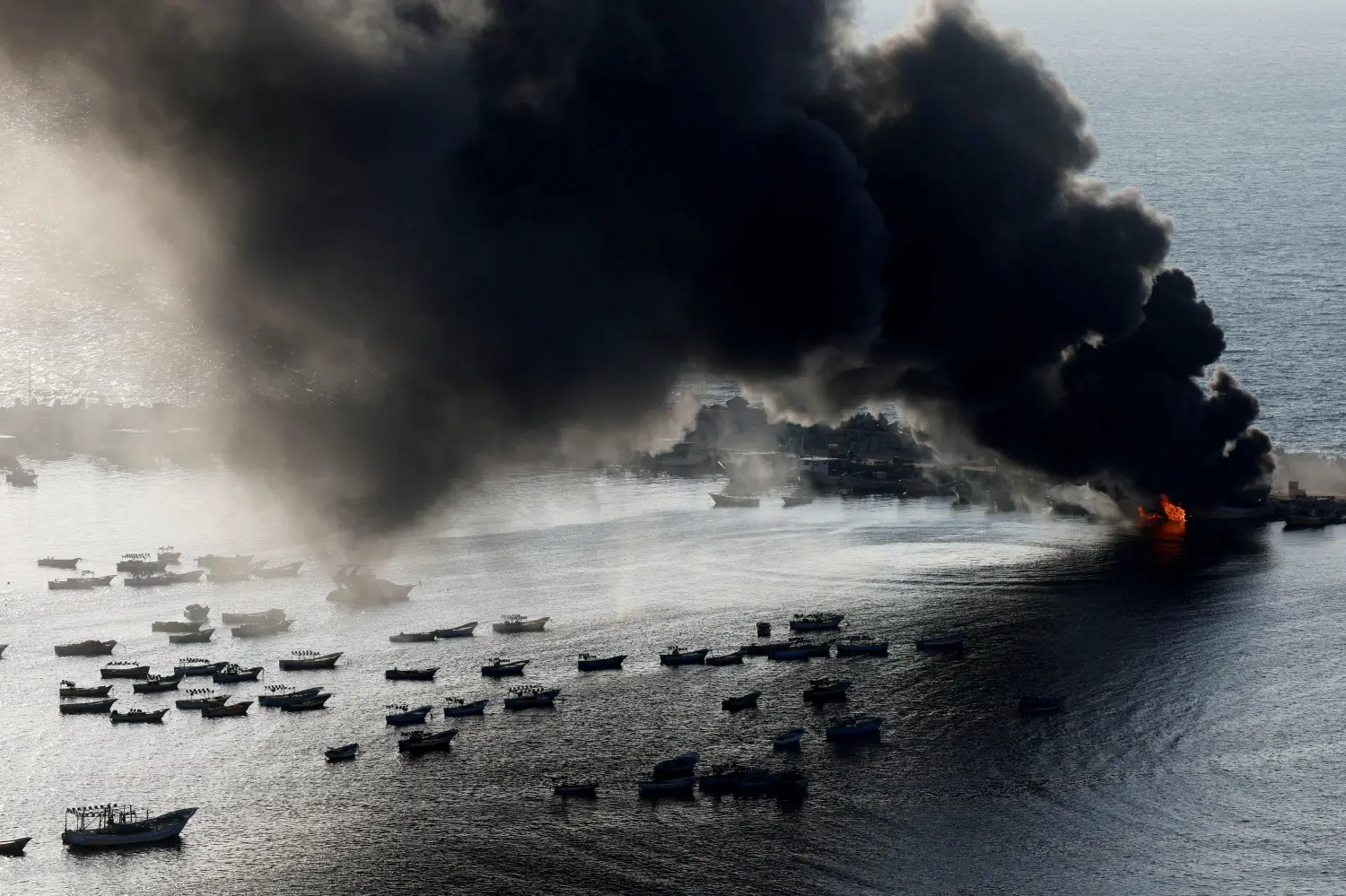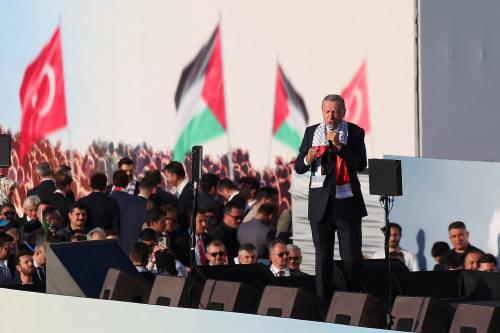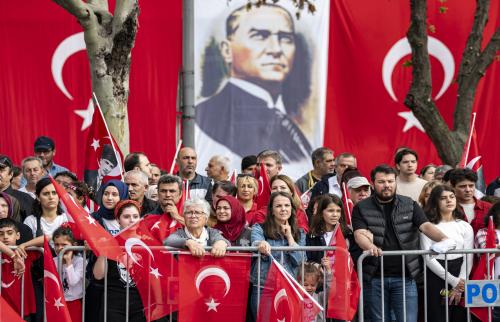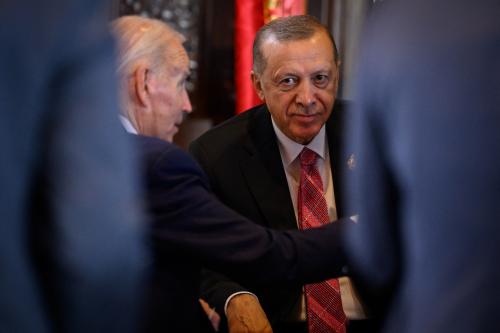This piece is part of the Center for Middle East Policy’s Israel-Gaza interviews series, in which leading experts unpack the conflict via in-depth Q&As. For an extended discussion of the political and ideological sources of Turkey’s approach to the present crisis in Gaza, please see: “The sultan’s ghost: Erdoğan and the Israeli-Palestinian conflict” by Aslı Aydıntaşbaş.
Turkey’s relationship with Israel and the Palestinian territories
KEVIN HUGGARD:
What approach has Turkey traditionally taken toward Israeli-Palestinian affairs under President Recep Tayyip Erdoğan? How does this issue fit into Turkey’s broader foreign policy?
ASLI AYDINTAŞBAŞ:
The Palestinian issue is front and center to Erdoğan’s vision of where he wants to take Turkey.
As two of the non-Arab states in the region, Turkey and Israel have long been fascinated with one another and have enjoyed close ties for much of their 74-year relationship.
But over the past two decades under Erdoğan, relations have been tumultuous, often in parallel with the ups and downs in Israeli-Palestinian tensions. In 2009, Erdoğan walked out of a panel with Shimon Peres in Davos after accusing the former Israeli president of killing children. In 2010, a Turkish aid flotilla tried to break the blockade of Gaza, leading to a deadly Israeli raid and years of cold peace between the two countries.
Although Turkey and Israel normalized ties in 2022, relations have dramatically worsened since Hamas’ October 7 attack and Israel’s military operations in Gaza. Erdoğan has taken a very harsh stance against Israel and the two countries have recalled their ambassadors — though trade relations continue.
Under Erdoğan, Turkey’s approach to the Israeli-Palestinian issue is distinctly different from the pre-Erdoğan, Kemalist period in two ways.
The first is Erdoğan’s belief in the legitimacy of Hamas as a viable Palestinian actor, which is a natural outcome of his ideological affinity for the Muslim Brotherhood. Erdoğan believes Hamas needs to be part of the political process and has moved the Turkish establishment toward that idea. Hamas has had a presence in Turkey and sent delegations there since it won the Palestinian elections in 2006. I should note that Ankara’s engagement is with Hamas’ political wing; as far as I know, there has been no Turkish support for the group’s military wing in Gaza. But Erdoğan has been open about his political support for Hamas — whose political representatives were reportedly in Turkey at the time of the attack.
Another distinction from the pre-Erdoğan age is the central role of the Palestinian issue in Turkey’s aspirations for regional leadership — and Erdoğan’s use of neo-Ottomanism to sell that idea to Turkish voters. The Turkish president has built his political platform on the theme of an ascending Turkey — with a historic responsibility to protect the dispossessed Muslim populations in the region, including, of course, the Palestinians. This notion of Turkish exceptionalism runs through all of Erdoğan’s foreign policy speeches and is at the core of his “Century of Turkey” platform. It also works well domestically for the voters: Erdoğan is the only leader standing up to Israel and the West, we are often told. This is how he wants to be remembered, as the leader who oversaw the rebirth of the Turkish empire and who hasn’t forgotten the Palestinians and Jerusalem.
Turkey’s response to the crisis
KEVIN HUGGARD:
How has Turkey responded to the present crisis? In your policy paper, you write that the evidence suggests that “the Turkish establishment views this as an inflection point, not a passing flare-up of the Israeli-Palestinian conflict.” Given this, has the Turkish policy response thus far represented a departure from its traditional posture toward Israel-Palestine?
ASLI AYDINTAŞBAŞ:
Erdoğan is known for his pragmatism and his skillful use of geopolitics to expand Turkey’s interests. When it suits his interests, he is willing to drop principles, reverse course, straddle between the West and Russia, reconcile with enemies, and so on. But not on the Palestinian issue. There is no pragmatism there. Erdoğan sees it as his calling to take a position against what Israel is doing, even if the price is isolation. It is clearly personal, ideological, and near and dear to his heart.
Turkey has taken the most strident anti-Israeli position within NATO, with Erdoğan organizing pro-Palestinian rallies himself and slamming both Israeli Prime Minister Benjamin Netanyahu and the United States. But he may have gone overboard this time. Erdoğan has called Hamas a “liberation movement” — openly stating “Hamas is not a terrorist organization” and accusing Israel of committing “genocide.” Of course, this is very different from what many Arab leaders have done, which is criticizing Israel for its disregard for Palestinian civilians while also keeping their distance from Hamas.
When I spoke to Turkish diplomats and officials, even secularists, I was struck by how deeply resentful of the U.S. approach they were. There is plenty of criticism of Western double standards when it comes to dealing with civilian casualties in Ukraine and Gaza.
I noticed something else in these conversations: Turks are not certain that the threat of regional war is gone. They see the U.S. military buildup in the Eastern Mediterranean not as a deterrent for Iran, which is what the Biden administration intends, but as a provocation for Iran and Russia. They seemed to think that this could still become a regional inflection point, with a new intifada or greater involvement by Iran’s proxies, and later Russia.
Turkish elite vs. societal opinion
KEVIN HUGGARD:
To what extent is the Turkish political response to this crisis driven by bottom-up societal demands as opposed to the top-down needs of its political leaders?
ASLI AYDINTAŞBAŞ:
No doubt the public is very sensitive to this issue — and in full sympathy with Palestinians. For the ordinary citizen, there is nonstop coverage of the suffering in Gaza and rolling commentary that Israel is able to do this because the United States allows it.
Public criticism of Hamas in the early days after the October 7 carnage is long gone. The picture that emerges in the public conversation is black and white, of the oppressor and the oppressed, with no nuance and barely a memory of what happened on October 7. There is also growing anti-Americanism for what is perceived as the United States’ blank check for Israel.
Erdoğan amplifies those sentiments and brings in an element of legitimization for Hamas by making the case that Hamas is not a terrorist organization. In doing this, he has been able to mold the public’s outlook on the issue: According to polling data from Metropoll, only 30% of respondents believe that Hamas is a terrorist organization.
This conflict has also allowed Erdoğan to make a case about a civilizational rift with the West. He calls it “crusader vs crescent” and of course, Turkey is on the side of the crescent. I worry that more and more people in Turkey are now buying this civilizational argument and think of Turkey as separate from the liberal order — which is described as immoral, bigoted, and hypocritical. I believe that the conflict in Gaza has just pushed Turkish society a few more inches towards the idea of a non-aligned Turkey.
Palestinian actors and Turkey’s Islamist-secular divide
KEVIN HUGGARD:
Does the Islamist-secular divide in Turkish politics inform which Palestinian actors Turkish leaders are likely to support (i.e., the main Islamist group, Hamas, or the primary secular nationalist one, Fatah)? Or does support for the Palestinian cause generally transcend those ideological divides in Turkey?
ASLI AYDINTAŞBAŞ:
I think the Palestinian cause now transcends the Islamist-secular divide.
For the government, the ideological battle has long been settled in favor of Hamas. While Turkey deals with both Fatah and Hamas and has at times hosted Palestinian Authority (PA) President Mahmoud Abbas and Hamas leader Ismail Haniyeh simultaneously, the PA is viewed as an ineffective entity — and Hamas a reality. In that sense, Turkey has elevated and legitimized Hamas’s position within the Muslim world.
But I don’t know what all that means for the future. We have no idea what Israelis are planning for Gaza or what type of a postwar Gaza administration will emerge. Qatar and Turkey will continue to deal with Hamas’ political wing. But if the PA steps in to take control of Gaza, meetings with Haniyeh or other Hamas leaders could be irrelevant.
For me, the real question is: will Turkey recalibrate and tone down its language on Hamas in order to have the type of access it wants in Gaza and the West Bank?
Turkey’s role in ending the fighting
KEVIN HUGGARD:
What role do you believe Turkey under Erdoğan would like to play in the diplomatic efforts to end the current fighting and begin reconstruction in Gaza?
ASLI AYDINTAŞBAŞ:
It is no secret that Erdoğan is eager to participate in the mediation efforts and in Gaza’s postwar reconstruction and governance. Turkey has had decades of peacekeeping experience in Somalia, Bosnia, and Afghanistan and has the capacity to play a role in Gaza. For Erdoğan, Turkish flags flying in Gaza would be the ultimate fulfillment of a historic mission.
But as it is, he has self-sabotaged any Turkish role in Gaza in the short term. Turkey is frozen out of the ongoing negotiations with Hamas because it has offended Israel so deeply in the latter’s time of need. Erdoğan has erred by using language that has not only angered the Israeli government but also alienated Israeli society. I doubt Israelis will want Turkey near Gaza — at least during the present Israeli government. As to what happens in a post-Netanyahu scene, it is too early to say.
But as I said before, Erdoğan is a pragmatist and I feel he is angling for a post-Netanyahu relationship in any case. Erdoğan is lashing out at Netanyahu but by personalizing it, he wants to keep open the door for engagement with a future Israeli government. We will see if that will work.
Additionally, Qatar is already playing a role in mediation efforts with Hamas. So, Turkey is not needed there, though Erdoğan would have loved to lead the negotiations in the way he did with the Black Sea grain deal or prisoner exchanges between Ukraine and Russia. Now it’s a question of what Turkey can do — and what Israel would want it to do — in a postwar Gaza. Unfortunately, the idea of a postwar Gaza is still too distant to speculate. But the three ideas would be humanitarian aid, reconstruction, and providing legitimacy to whatever governance structure emerges. Turkey would also be eager to help with governance issues in Gaza, but no one in the neighborhood would like that, including Egypt, Iran, and the other Arab states.
Turkish-U.S. relations
KEVIN HUGGARD:
What role do Turkey and the United States’ respective Israeli-Palestinian policies play in their bilateral relationship? Have their diverging responses to the present crisis elevated tensions between Washington and Ankara?
ASLI AYDINTAŞBAŞ:
No doubt it has made an already difficult relationship more complicated.
The October 7 attack came at a fragile moment in Turkish-U.S. relations — which have been tumultuous for almost a decade. People were hoping for a reset of sorts, but it’s now more difficult. Erdoğan refused to meet with U.S. Secretary of State Antony Blinken on his recent visit to Turkey and has described the United States as the main culprit behind Israel’s actions. He seems to view this in civilizational terms and is deeply suspicious of the U.S. military buildup in the area.
The Turkish-U.S. relationship is a metaphor for a failed marriage — and they cannot even agree on an amicable separation. (Divorce is not an option because their NATO membership is an iron-clad prenup.) Everyone understands there needs to be some guardrails to prevent this relationship from further deteriorating, but the strategic divergence is now all too real and hard to ignore. Turkish and U.S. officials are aware that they need to be in a better place than this. But when they sit together, they both have a long list of demands and grievances and it’s always a question of who will go first.
How President Biden can engage Turkey
KEVIN HUGGARD:
You write that Turkey’s response contains contradictory desires for “wanting to lead the charge against the West/Israel and seeking visibility and leadership in a postwar settlement.” In light of this contradiction in the Turkish position, how might the Biden administration best engage with Turkey in efforts to create a post-conflict settlement?
ASLI AYDINTAŞBAŞ:
Washington would have been open to involving Turkey in hostage negotiations or as part of a future humanitarian framework. But Israelis need to sign off on that and I am not sure they are there. It’s important to harness the interest Erdoğan has in Gaza for a constructive engagement. But it’s not a priority on anyone’s mind. For the Biden administration, the priority with Turkey now is getting Turkish approval for Sweden’s NATO accession — and once that happens, I imagine there will be more of a conversation on Gaza and Syria. That could pick up if Erdoğan tones it down on Hamas or Netanyahu leaves office.
But sooner or later, the Biden administration will want to engage with Turkey. Erdoğan’s intermediation might not be necessary for the hostage negotiations, but Turkey’s stamp of approval will be important in legitimizing whatever structure is going to emerge in postwar Gaza. Turkey is a regional heavyweight and has enormous influence in the Sunni world. It would be counterproductive to leave Turkey out of the tent.
The Brookings Institution is committed to quality, independence, and impact.
We are supported by a diverse array of funders. In line with our values and policies, each Brookings publication represents the sole views of its author(s).









Commentary
Understanding Turkey’s response to the Israel-Gaza crisis
December 7, 2023